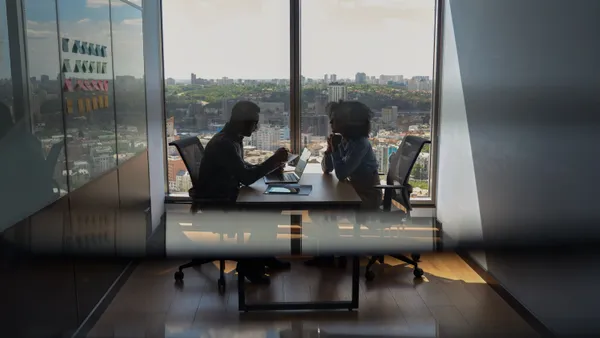Dive Brief:
- Highly motivated workers check out for a total of six weeks every year, a new study by RingCentral Glip found. More than 90% of workers said they are motivated and driven workers. Half marked themselves as "very motivated" and another 88% said they are committed to doing their best work. Despite this, nearly all workers "check out" at some point during the day, usually for an hour beyond lunch breaks or other scheduled rest periods, according to the study.
- Broken down by position, 22% of C-suite members, 34% of directors and managers and 28% of the most motivated employees said they check out for an hour every day. By generational divisions, baby boomers, millennials and members of Gen X and Gen Z said they are highly motivated, but millennials and Gen Zers are twice as likely as those from the other two generations to disengage.
- Almost two-thirds of respondents ages 18-34 said they're motivated by video meetings and team messaging. Respondents said they are motivated by having friends at work, but workers without team messaging are twice as likely to have no friends at work. Remote work options motivate 84% of workers and 23% of workers with team messaging are more likely to work remotely than those without it.
Dive Insight:
Employers, especially those that use digital tools like team messaging, should be encouraged that workers report high levels of motivation. They should also consider the effects a fast-pace work environment may have on employees, according to Mike Pugh, VP of collaboration at RingCentral Glip. "The pace of work is increasing, and all of these amazing tools that allow people to collaborate and be one click away from their coworkers enable us to get amazing amounts of work done, but also put a high tax on our attention span," he told HR Dive in an interview. "Companies need to understand that this is the new normal."
Pugh compared this new workflow — hours of focus yielding high productivity interspersed with lengthy breaks — to a football game. Workers who pull their weight connecting passes and making touch downs will need to step off the field and throw back some Gatorade before they return to the turf. "These breaks are a required part of being able to go fast," Pugh said. "The tempo it takes to do an 8-hour day is a constant sprint. Without these breaks where you're able to let your gaze wander, let your feet walk, talk to someone live instead of virtually — these kind of breaks are necessary."
This may be "the new normal," as Pugh said, but most employers won't be able to ignore the cost of chronic disengagement. A study by Mental Health America (MHA) with the Faas Foundation found that disengagement can cost employers as much as $500 million in lost productivity a year. Another study found that employees can't work for even six minutes without checking incoming email or text messages, according to RescueTime.
A happy medium — one that doesn't cost employers millions but still affords employees the high intensity, rest-filled pace they need — may exist. Employers might need to guide their employees in how to resist digital distractions, issuing guidance and expectations surrounding technology habits. Employers can also encourage employees to take frequent, short, intentional breaks that don't bleed into hours of lost time. The New York Times found that employees who take five-minute walks throughout the day experienced lifted moods, reduced lethargy and improved overall health.
Correction: An early version of this article misstated the name of the company. The company is called RingCentral Glip.












